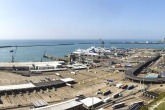Contract signed for Drakelow EfW plant
Energy company Vital Energi has signed a contract to develop a new energy-from-waste (EfW) plant in Drakelow, near Burton upon Trent.

Scheduled for completion by 2023, the new plant is set to generate 18 megawatts of electricity (MWe) from 169,000 tonnes of refuse derived fuel (RDF) each year.
The Vital Energi team, which has already designed the EfW plant, will now be overseeing the building, ownership and operation of the facility on land leased to the company on a 30-year concession by energy company EON..
Ashley Malin, Vital Energi’s Project Development Director, explained: “The UK faces many environmental challenges and this facility is an exciting opportunity to reduce carbon emissions and divert waste from landfill. We are extremely excited to be delivering and operating this facility, which will make a positive contribution to the UK’s low-carbon infrastructure.
“We have worked with a team of industry experts in the EfW sector to bring this project to market and we would like to thank them for their contributions to deliver a major project.”
Vital Energi has received support from a number of companies and stakeholders, including Squire Patton Boggs, which provided legal support and technical adviser Royal Haskoning, which will act as the Owner’s Engineer. Original planning permission had been procured by Future Earth Energy (FEE), while Beauparc Group has been awarded the fuel agreement to supply RDF to the Drakelow plant.
Domestic infrastructure
As the Netherlands prepares to impose an import tax of €32 per tonne of foreign RDF, the UK is looking to process more waste domestically to avoid the increasing cost of exports, boosting UK infrastructure with new EfW plants such as Drakelow and Javelin Park in Gloucester.
With markets continuing to tighten, exports of RDF fell by 15.7 per cent in 2019 – a reflection of increasing uncertainties, to which Brexit remains a key contributing factor. Although the government had confirmed in early 2019 that 100 per cent of the UK’s notified waste shipments to the EU would be maintained in the event of a ‘no deal’ Brexit, former Environment Secretary Michael Gove warned on Monday (10 February) that trade barriers and checks will be imposed at the end of the Brexit transition period on 1 January 2021. This is expected to result in delays at container ports, which, combined with the rising costs of exports, could place considerable pressure on domestic residual capacity. 









